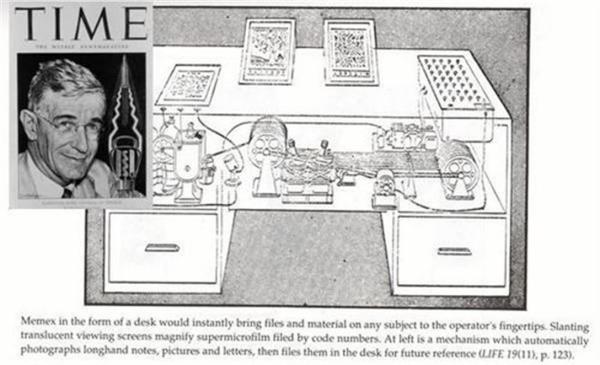How (and where) NOT to make YOUR Memex
On somebody else’s computer, of course.

In 1945, Vannevar Bush described a device he called “memex” that, at first reading, may look a lot like today’s World Wide Web. A memex would be a special, electro-mechanical desk with an embedded microfilm reader that would:
- allow its user to “store all his books, records, and communications”
- be searchable “with exceeding speed and flexibility”, to the point of being “an enlarged intimate supplement to the user’s memory”
- allow its user to “link to sources and comment on them”
- create, bookmark and share “trails of research questions, with links and excerpts of sources”
Social Media are NOT a Memex
At first sight, the Memex imagined by Vannevar Bush may look a lot like our World Wide Web. But it is not. Sarah Constantin summarizes very well the huge, crucial difference between Bush’s Memex and today’s “Web 2.0”, and its effects:
- “Bush imagined the memex as a private (though shareable) record, not a communal one. Each person should have their own memex."
- This matters because people need complex private thought. In order to appear and survive, that thought needs “own interpretations of what one reads, forming a private “cathedral-like” structure” of everything one learns.
- [Before the World Wide Web] “Educated men and women of the 19th century worked at constructing inner lives through diaries, letters” and other private devices and procedures
- Today [thanks to the Internet], educated people also read and write a lot, but in an ephemeral and exposed fashion.
What’s worst, regardless of depth, social media defaults don’t let you organize your own space as you want. I myself recently presented how and why services like Google Docs “reduce the value of any individual creative act by placing what’s new before what’s IMPORTANT”.
Memex has no peer pressure, social media ARE peer pressure

Moreover, continues Constantin:
- immediate public sharing constantly forces on us what others will think of our writing
- this pushes us to not write anything controversial (hey, who would have known..?), or too “complex”:
“If you do all your thinking in public, in venues where you always have to start from a presumption of zero familiarity with your other thought, you can’t create complex thoughts at all."
And this, eventually, makes all of us dumber
For more on the same general theme, you may also read why we NEED to keep reading books: in a nutshell, reading long, complex texts” is necessary and unreplaceable in order to [“expand the interiority of our thinking and reasoning [and continue to have] meaningful discourse in our lives together”. Nothing new here, sadly.
Right diagnosis, wrong solution
For Constantin, the solution to all the problems above is to create a personal memex, that is “a record of your thoughts and associations, which you will only share parts of with others [that is] certainly an upgrade from either a diary or a blog”.
Constantin describes the problem wonderfully, but points to the wrong solution: online services run by for-profit companies, just like Facebook or Google. The limits of this non-solution are in the comments to Constantin’s post itself:
- Invest the effort of putting your stuff into a beta cloud so you can find out when they launch how much it will cost to keep accessing your data?
- How is [the service you recommend] private? Data is still stored on their servers, without end to end encryption afaik. The fear for a data breach makes me limit myself again
Sooner or later, every non-portable service for organizing your thoughts and data can end up like Google Reader or Tumblr: it will disappear altogether, leaving you with fake, useless “data portability”, or become incompatible with your wallet or ethical positions.
It’s time to join the personal websiteverse instead, and this remains my own personal proposal on how this may happen.
Who writes this, why, and how to help
I am Marco Fioretti, tech writer and aspiring polymath doing human-digital research and popularization.
I do it because YOUR civil rights and the quality of YOUR life depend every year more on how software is used AROUND you.
To this end, I have already shared more than a million words on this blog, without any paywall or user tracking, and am sharing the next million through a newsletter, also without any paywall.
The more direct support I get, the more I can continue to inform for free parents, teachers, decision makers, and everybody else who should know more stuff like this. You can support me with paid subscriptions to my newsletter, donations via PayPal (mfioretti@nexaima.net) or LiberaPay, or in any of the other ways listed here.THANKS for your support!